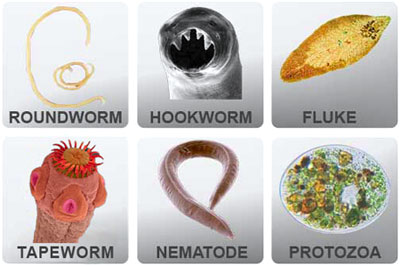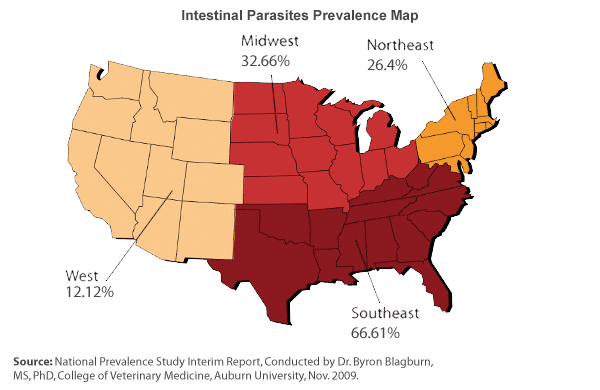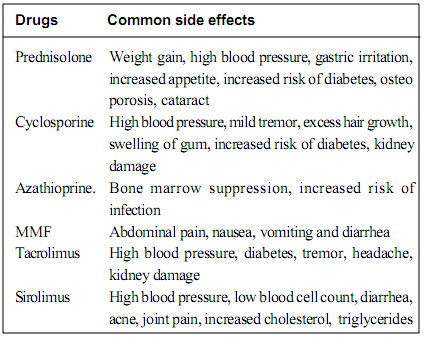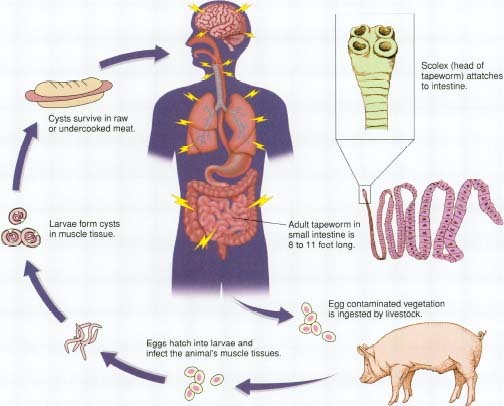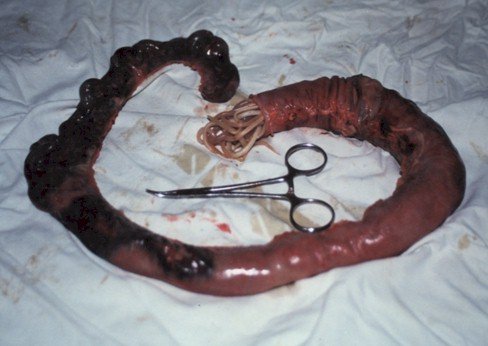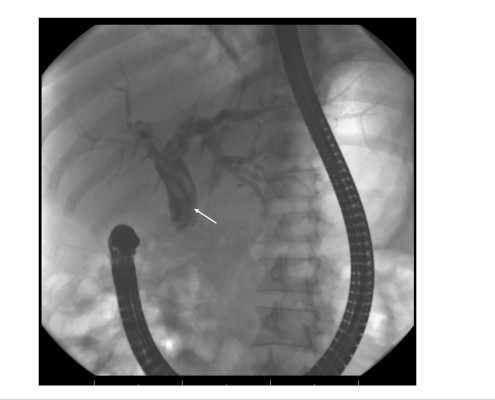Information in this article was first shared by Digestive Care Advanced Naturals Newsletter
www.advancednaturals.com
Parasites: A Widespread Problem
A parasite is an organism that lives off another organism. For example, once inside the human body a parasite will feed off our cells and the food and supplements we consume, thereby draining our energy and causing an overall decline in the state of our health. Although there are more than 3,000 varieties of parasites, there are two main types of intestinal parasites: helminths and protozoa.
Helminths are essentially worms with many cells, and they can range in length from less than one centimeter (e.g. threadworms) to up to 12 meters in length (e.g. tapeworms). Typically, helminths cannot multiply in the human body and will eventually clear up without subsequent infection. Protozoa, on the other hand, have only one cell and an multiply inside the human body. Most protozoa are only visible under a microscope.
It is a common misconception that parasite infestation is found mainly in third-world countries or in Americans who travel extensively. In fact, studies have indicated that as much as 85% of the people in the United States has at least one form of parasite, and some authorities believe the true figure may be as high as 95%. Not surprisingly, the Centers for Disease Control considers parasites their number-one health risk. Indeed, no one is immune to parasite infestation. Yet, although the problem is widespread, parasite infestation often goes unrecognized by the majority of those in the medical establishment. Because such infestation has been considered, for the most part, a disease of the tropics, the average physician is not likely to consider it among his or her list of possibilities when making a diagnosis. Further, parasitology is seldom a subject of focus in mainstream medical journals or among medical school curricula.
Apart from the records kept by the CDC, there is little tracking done with regard to parasitic infestation, and very few parasitic diseases are nationally reportable. With such a shortage of available information, doctors seldom consider parasites when determining the underlying cause of illness.
What contributes to parasite infestation?
Parasite infestation can be caused by a number of factors. However, the major contributors are nutritional deficiency, the overuse of immunosuppressant drugs, and a polluted colon.
Nutritional deficiency. Animals raised on protein-deficient diets (as well as those lacking vitamins A, B1, B2, biotin, folic acid and other nutrients) are more prone to parasite infestation. In contrast, when those same parasites are implanted in healthy animals, infestations have not occurred as long as the diet has been adequate. These data illustrate how nutrition affects the internal environment of the body, which in turn plays a key role in determining whether parasites will remain in the body or pass through.
Immunosuppressant drugs. Many of the drugs in common use today are specifically formulated to suppress immune function and therefore increase our susceptibility to parasitic infestation.
Polluted colon. While many external factors contribute to the growing parasite problem, the most common contributor by far is a polluted colon – largely the result of an unhealthy lifestyle and bacterial imbalance. Once the ideal ratio of good to bad bacteria in the intestines (85% good or neutral to 15% harmful bacteria) is disrupted, the resulting imbalance creates an environment conducive to parasite infestation. Factors that contribute to this imbalance include: antibiotics, steroid drugs, x-rays/radiation therapy, birth control pills, refined carbohydrates, and chlorinated water.
How do parasites get in?
Parasites can enter the body in a number of ways. They can be ingested through the mouth; inhaled through the nose; contracted through the skin (including the soles of the feet); or they may be transmitted via carrier insects. Common sources of parasites include contaminated soil, water and food; contact with feces (as in a daycare center); contact with a human or animal already infected with parasites; and insect bites.
According to the Centers for Disease Control (CDC), illnesses linked to contaminated fruits and vegetables are on the rise. One reason could be the increased demand for fresh produce, as the United States more than doubled its fruit and vegetable imports from 1994 to 2004 to reach $12.7 billion according to the U.S. Department of Agriculture. Unfortunately, some of the produce comes from developing nations where sanitation facilities are less advanced or where they commonly practice the use of human feces as fertilizer.
Recreational Water Illness (RWI) is another manner in which parasites are spread. RWI occurs when swimmers suffering from diarrhea contaminate the water with the germs they carry. On average, people have about 0.14 grams of feces on their bottoms which, when rinsed off, can contaminate recreational water. When people are ill with diarrhea, their stool can contain millions of germs. Many of these diarrhea-causing germs do not have to be swallowed in large amounts to cause illness.
Although current medical texts contain very little information about parasites, it is important to remember that parasites can mimic other disorders and/or produce no noticeable symptoms. Parasites can affect tissue anywhere in the body, and they have been linked to a host of health issues and diseases, including arthritis, multiple sclerosis, appendicitis, weight problems, cancer and epilepsy.
Tapeworm Life Cycle:
Parasites: Identification and Solutions
Symptoms:
Below are some of the more common symptoms of parasites:
- Allergies
- Anemia
- Bed-wetting
- Brain Fog
- Diarrhea or constipation
- Digestive complaints (gas, bloating and cramping)
- Disturbed sleep
- Irritability/nervousness
- Irritable Bowel Syndrome
- Joint pain
- Muscle cramps
- Overall fatigue
- Granulomas (tumor-like masses that encase destroyed larva or parasites)
- Pain in the umbilicus
- Persistent skin problems
- Postnasal drip
- Prostatitis
- Rectal itching
- Sugar craving
- Teeth grinding
- Ravenous appetite (or loss of appetite)
Because parasites can get into the blood and travel to any organ, they often cause problems not typically recognized as parasite-related. This can result in an incorrect or incomplete diagnosis. For example, a roundworm infestation in the stomach can give the appearance of a peptic ulcer. And chronic Giardia lamblia can be an undetected element or missing diagnosis in both candidiasis and chronic fatigue syndrome.
Not only can parasites cause damage to the body, but the waste they excrete is also harmful. Such waste products poison the body, forcing the organs of elimination to work overtime and adding stress to the immune system. As the body’s natural detoxification mechanisms become overwhelmed, nutritional reserves are depleted and the immune system weakens, which can lead to disease.
Ascaris Lumbricoides removed during a colectomy:
Do I have parasites?
There are a number of ways in which a person can determine whether or not he or she has a parasite. A stool or fecal exam is used to find parasites that cause diarrhea, loose or watery stools, cramping, flatulence and other abdominal illness. In that case, the CDC recommends that three or more stool samples be collected on separate days prior to examination. However, one must remember that since parasites tend to hide in the lining of the intestine and in other organs, they can be difficult to detect. Parasites in the heart or lungs may not show up in a stool sample regardless of how well it is analyzed. An endoscopy may also be to detect parasites when a fecal exam does not reveal the cause of diarrhea.
Blood tests can be used to look for a specific parasite infection; however there is no blood test that will detect all parasitic infections. Typically there are two types of blood tests that your physician or healthcare provider will order: serology, which is used to detect antibodies or parasite antigens in the blood; and a blood smear, which is used to detect parasites that are found in the blood.
Again, it is important to remember that tests are only available for 40-50 types of the more than 1,000 species of parasites that can live in the body, and a negative lab test is no assurance that a person does not have parasites. Finally, your physician may use an X-ray, MRI, or CAT scan to detect certain parasite-related diseases that may cause swelling in the internal organs or abnormal scarring.
The Solution:
How to get rid of parasites
Supplementation: Take the appropriate herbal supplements to combat parasites.
Minimize Meds: Eliminate or minimize the use of antibiotics, steroids, immunosuppressant drugs, and oral contraceptives (consult your physician prior to discontinuing any medication).
Wear Shoes: Avoid walking barefoot, especially in grassy areas used by animals.
Pet Protocol: Do not allow your pet(s) to sleep with you or lick your face. Wear gloves when cleaning pet areas, especially a litter box.
Avoid Mosquitoes: Wear protective clothing while outdoors to avoid being bitten by mosquitoes.
Dietary Changes: Change your diet and lifestyle to exclude foods and substances known to contribute to bacterial imbalance. These include refined and processed foods, sugar of any kind and alcohol, as well as antibiotics and steroid drugs. Avoid foods and/or beverages that may be contaminated, such as unwashed fruits or vegetables, sushi or sashimi, unfiltered water, and raw or under-cooked meats.
Add More Fiber: Increase your fiber intake with a healthy balance of soluble and insoluble fiber.
Drink Water: Drink plenty of purified water, at least half your body weight in ounces each day. (For example, a 120-pound person would require 60 ounces of water, or seven tall glasses.)

